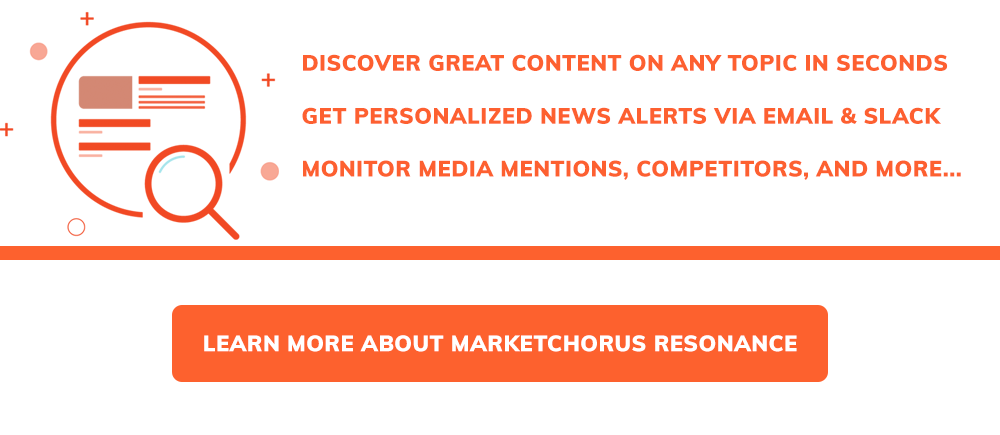A quick search for “content intelligence” on Google returns a small amount of useful information, and a lot of confusion. So, first, allow me to provide a simple working definition for content intelligence that we’ll improve throughout this article:
Simple version: Content intelligence technology helps you understand context and impact to produce better content and use content more effectively.
So what’s the confusion? The term is used by two very different types of technology, content marketing tools and enterprise document management systems. Providers of those enterprise solutions sometimes refer to their technology as “content intelligence”.
But there’s already a cool industry buzzword for that kind of software…it’s called enterprise search. So I’m claiming “content intelligence” for marketers.
There, I did it. It’s done.
[toc]I’m not making this claim alone…later in this article I’ll list all of MarketChorus’ competitors and contemporaries (that I can find at the present time) to provide an overview of our little corner of the industry.
All of those brands also refer to themselves as “content intelligence” providers; so MarketChorus is by no means alone in this space.
The combined content intelligence industry is projected to grow from USD 485 Million in 2019 to USD 1956 Million by 2024, at a Compound Annual Growth Rate (CAGR) of 32.2% during 2019–2024.
(Source: MarketsAndMarkets).
There’s a lot going on in this industry…
It’s an exciting area of technology to be involved in with the global content marketing industry roughly doubling in value from 2017-2021 (reaching $400B+ annually).
(Source: Technavio)
So here’s the first of 3 important definitions for content intelligence, looking at it from a financial / global market standpoint:

Definition #1: Content Intelligence, From A Financial Perspective
Content intelligence is technology which serves as a force multiplier for content marketing efforts by providing predictive and prescriptive analytics on content and its impact on the audience. This means direct and indirect improvements to financial outcomes tied to content marketing efforts through reduced waste and improved ROI.
Stated simply, the content marketing industry is booming and when companies are investing that much money into content, it needs to work…to drive leads, create efficiencies, etc. Content that doesn’t work isn’t just wasting money, it’s wasting opportunity.
Content intelligence is technology built to solve that problem, to understand the context of any piece of content, optimize it, and maximize its impact.
Which leads us to my second definition for this emerging sector of the martech industry. From a technical perspective, what does a platform need to include to qualify as content intelligence software?

Definition #2: Content Intelligence, From A Technical Perspective
Content intelligence is software, built on machine learning algorithms, that compiles data on content and its audience for the purposes of optimization and amplification of content marketing efforts.
Content intelligence platforms are built on artificial intelligence. It’s a defining characteristic of this sector of martech solutions for one all-encompassing reason:
AI compiles and analyzes data faster and more efficiently than human analysts ever could and this enables content marketers to optimize their efforts in near real-time.
Machine learning algorithms are great at tasks that humans tend to do less efficiently in volume; tasks that human analysts get burned out on over time.
Of course, human operators are much better at coming up with creative solutions than observing and predicting patterns. The obvious conclusion in all of this is that you should employ humans to do the tasks they excel at doing and let AI handle number crunching and other drudgery.
Which is a great segue to my third definition…

Definition #3: Content Intelligence, From A Creative Perspective
Content intelligence is freedom from the need to guess what topics will interest readers, the grind of producing endless pieces of content that go unread, and the disappointment of failed campaigns.
When you’re provided with data on what empirically is and isn’t working throughout the customer lifecycle, based on what customers are (and aren’t) doing with your content -you can tailor your efforts, eliminate waste, and more richly personalize the customer experience.
With the right content intelligence tools you should not need time-consuming habits like brainstorm meetings, content audits, or research briefs. AI can automate nearly every aspect of these tasks, freeing marketers’ time to focus on truly creative and truly innovative efforts.
Benefits Of Content Intelligence
Content marketing tools already exist by the dozens (thousands actually) and the market feels ripe for consolidation, so why is content intelligence such a hot space in the martech universe?
It’s my original premise. Content marketing is a big investment. The difference between really good content and mediocre content is the difference between a really good ROI and none at all.
There is just no space for content that isn’t really good. Really good is the new minimum requirement.
There are plenty of topics worth covering but you’re not going to be able to only produce high-level content and expect to see results.
You’re going to have to get specific, dig deep, and give freely of your expertise to tell your audience anything they don’t already know (or can’t get elsewhere).
And that’s where content intelligence comes in…
The amount of time and money your organization has to invest into a sustained, effective content marketing practice is significant. It has to work. It must yield measurable, predictable results. There isn’t room for error any more.
Imagine technology that can predict how content on any topic is likely to perform, before you even start writing, based on how similar content is performing right now on social media.
That’s an example of the power of content intelligence. Predicting future performance on real-time data is what machine learning is all about.
It’s also one of the many things our platform does.

MarketChorus Resonance is software that supports content marketers and publishers by automating expensive and time-consuming tasks like research, curation, audience discovery, real-time monitoring / analysis, and others.
The content intelligence market has broad potential and this example is only one of the many problems that solutions providers in this space will tackle in the coming years.
Our peers in the industry all offer different and fascinating insights into the way audiences learn from, and engage with, content and its producers.
The fact that we all share very little overlap in capabilities speaks to the enormity of the opportunity in our little corner of the booming global content industry.
Here is a small list of the tasks you’ll one day accomplish aided by content intelligence software:
- Knowing how / when / where to distribute content most effectively.
- Understanding and predicting the performance on content on social media.
- Discovering high quality content on any topic in seconds.
- Analyzing competitors and uncovering their content strategies.
- Tracking ideas and topics across thousands of social media conversations.
- Measuring and tracking influence.
- Detecting buyer intent.
- Gaining insights for personalization.
- Spotting emerging trends (early).
- Generating first party contextual data.
- Expeditiung / automating research.
- Conquesting competitor audiences.
- Prospecting for lookalikes.
And so much more beyond this, but you get the idea…

Content Intelligence Platforms in The Market Today
AtomicReach, BuzzSumo, Ceralytics, ClearVoice, Concured, Cortex, CoSchedule, Crayon, Curata, GrooveJar, Hawkeye, Idio, Infer, Knotch, Qordoba, Persado, PowerPost, Rehinged, Semaphore, Vennli…and us, MarketChorus!
Implementing Content Intelligence In Your Organization
So far, we’ve discussed how content marketing is expensive, how content marketers could get better results if we had better data, and how there are many tools you can buy to help.
But how do you actually go about implementing a content intelligence platform, or for that matter, find the right one to implement?
Sure, AI simplifies complex problems. But, unfortunately, implementing AI isn’t all that simple. Subscribing to MarketChorus, or any of these other platforms, is very simple. But software is only as good the team that knows how to use it -and the work they can accomplish.
Implementing content intelligence means changing your content marketing practice dramatically.
It means learning enough about how the algorithms work that you trust them and feel confident in acting on the insights and recommendations they provide.

Let’s review some areas of your content marketing practice that will need to adapt to take full advantage of a content intelligence platform:
- Assess the current cost and challenges of your content marketing efforts
What are the roadblocks, bottlenecks, and hurdles your content marketing team faces? What information do they need to do their jobs better? How much are their efforts costing the organization and what results are they able to drive with the current team and tools? - Identify roles: Analyst / Strategist, Producer, and Consumer
Different people will need different things from any content intelligence solution you decide to implement. Map out those priorities, and the people who own them, in advance so that you can equip them with the capabilities they need.
Analysts direct content strategy, informed by AI powered research and analysis tools.
Producers have clear strategy and lots of data, saving time and improving the end result.
Consumers receive reports and notifications and communicate progress to the rest of the organization. - Change habits: Brainstorming, Optimizing, Audience Development
Things change when you add AI. Robots that give you advice are only useful if you can trust them and listen to them.
Before brainstorming, plan to spend time researching topics more deeply. You can afford this up front investment because the tools do most of the work. Finding high-quality information on any topic takes only a few seconds. Developing processes to take advantage of everything available to you is the new challenge.
You can accurately predict which topics will and won’t generate attention by monitoring everything that’s being published on that subject in the world, in real-time. That’s easy today. Turning those insights into actions you can take, in real-time, is the new game.
Perhaps best of all, you can sift through social media to find thousands of prospects, influencers, advocates, and other engaged audiences at the click of a button. Knowing that you have an audience for your content before you invest your time increases your rate of success significantly. - Monitor, Measure, Analyze, And Adapt
I’m not just saying this as a data nerd. The only way to improve is to monitor your progress, measure your success, analyze your failures, and adapt your approach. Leveraging AI to help you do this in real-time means that your biggest limiting factor is now your organization’s ability to embrace change.

Final Definition, In A Nutshell
Content intelligence is machine learning technology that helps content marketers and publishers be more efficient, more effective, and happier because they don’t have to do what they hate -and they can focus on what they love.
There are many providers of content intelligence solutions enriching this growing sector of AI technology. Many are listed in this article. Many more will emerge in the coming months and years. Niche today. Mainstream tomorrow?
And the benefits are huge. Save big money. Improve ROI. Scale efforts. Make that flywheel turn. Content powers the digital world, which pretty much powers the physical world.
Since you’re already investing big into content (we all are), get your money’s worth. Invest strategically in content intelligence to make your investment in content marketing grow better over time.
That’s what we’re committed to helping brands and organizations like yours accomplish. It’s what we built MarketChorus Resonance to do: Understand what people are interested in and to extrapolate intent based on the content they read and share.
With that powerful combination of data you can do many, many fascinating things and we’re excited to work with professionals like you to put this technology to good use.
Imagine what your content team could do with the power of AI at their fingertips…reach out to MarketChorus to see a quick demo of Resonance today.



